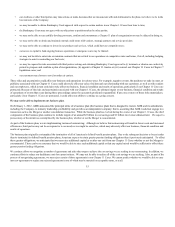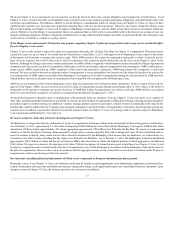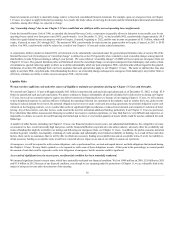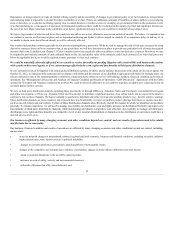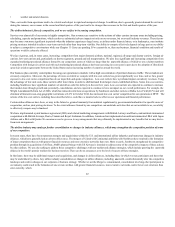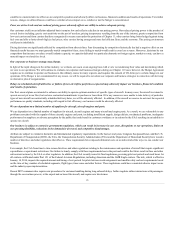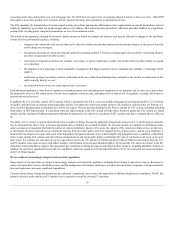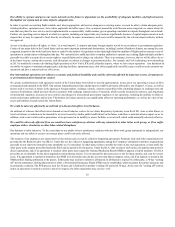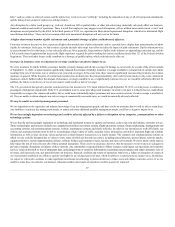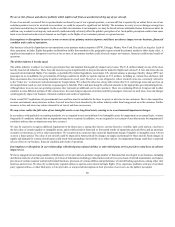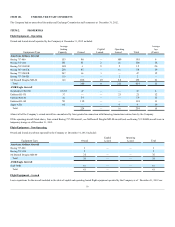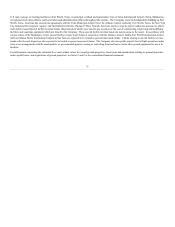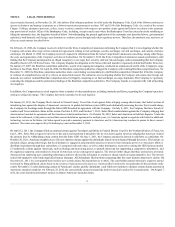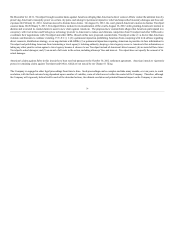American Airlines 2012 Annual Report Download - page 25
Download and view the complete annual report
Please find page 25 of the 2012 American Airlines annual report below. You can navigate through the pages in the report by either clicking on the pages listed below, or by using the keyword search tool below to find specific information within the annual report.
trading scheme (ETS) to aviation. This would require us to annually submit emission allowances in order to operate flights to and from EU member states in
January 2012 and thereafter, including flights between the U.S. and EU member states. In November 2012, the European Commission proposed to suspend
for one year the ETS' application to flights entering and departing Europe, to allow ICAO to propose an alternate global emissions reduction scheme. Under the
terms of the proposal, with the exception of intra-Europe flights, the monitoring and reporting of emissions, which became effective in 2012, and the
submission of emission allowances, scheduled to occur before the end of April 2013, will be suspended and the EU will not collect allowances from airlines in
2013. The proposal is expected to be approved by the European Parliament and EU member states represented in the EU Council in the first quarter of 2013.
The ETS may be reactivated if ICAO does not make progress towards an alternate global scheme within the next year. The U.S. enacted legislation in
November 2012 that will allow the Secretary of Transportation to prohibit U.S. airlines from participating in the ETS. While these measures create some
uncertainty as to the extent to which we will be required to participate in the ETS going forward, it is nevertheless increasingly likely that in the future we will
be required to participate in some form of international arrangement governing aircraft emissions. Although the cost of compliance with the ETS, or any
alternate global scheme, is difficult to predict because certain key parameters, such as the number and price of emission allowances we may be required to
purchase, are unknown, such costs could be significant.
Other legislative or regulatory actions addressing climate change and emissions from aviation that may be taken in the future by the U.S., state or foreign
governments or through international treaties may adversely affect our business and financial results. Climate change legislation was previously introduced in
Congress; such legislation could be re-introduced in the future by Congress and state legislatures, and could contain provisions affecting the aviation industry.
In addition, the U.S. Environmental Protection Agency could seek to regulate greenhouse gas emissions from aircraft. It is currently unknown how climate
change legislation or regulation, if enacted, would specifically apply to the aviation industry. However, the impact on us of any climate change legislation or
regulation is likely to be adverse and related costs of compliance could be significant. Such legislation or regulation could result in, among other things,
increased fuel costs, carbon taxes or fees, the imposition of requirements to purchase emission offsets or credits, increased aircraft and equipment costs, and
restrictions on the growth of airline operations. We continue to evaluate ongoing climate change developments at the international, federal and state levels and
assess the potential associated impacts on our business and operations.
Ongoing data security compliance requirements could increase our costs, and any significant data breach could harm our business, financial
condition or results of operations.
Our business requires the appropriate and secure utilization of customer and other sensitive information. We cannot be certain that advances in criminal
capabilities (including cyber attacks or cyber intrusions over the internet, malware, computer viruses and the like), discovery of new vulnerabilities or
attempts to exploit existing vulnerabilities in our systems, other data thefts, physical system or network break-ins or inappropriate access, or other
developments will not compromise or breach the technology protecting the networks that access and store sensitive information. The risk of a security breach
or disruption, particularly through cyber attack or cyber intrusion, including by computer hackers, foreign governments and cyber terrorists, has increased
as the number, intensity and sophistication of attempted attacks and intrusions from around the world have increased. Furthermore, there has been heightened
legislative and regulatory focus on data security in the U.S. and abroad (particularly in the EU), including requirements for varying levels of customer
notification in the event of a data breach.
In addition, many of our commercial partners, including credit card companies, have imposed data security standards that we must meet. In particular, we
are required by the Payment Card Industry Security Standards Council, founded by the credit card companies, to comply with their highest level of data
security standards. While we continue our efforts to meet these standards, new and revised standards may be imposed that may be difficult for us to meet and
could increase our costs.
Failure to comply with the Payment Card Industry Standards discussed above or other privacy and data use and security requirements of our partners or
related laws, rules and regulations to which we are subject may harm our reputation with our customers and expose us to claims for contract breach, fines,
sanctions or other penalties, which could materially and adversely affect our business, financial condition and results of operations. In addition, failure to
address appropriately these issues could also give rise to additional legal risks, which, in turn, could increase the size and number of litigation claims and
damages asserted or subject us to enforcement actions, fines and penalties and cause us to incur further related costs and expenses.
We could be adversely affected by conflicts overseas or terrorist attacks.
Actual or threatened U.S. military involvement in overseas operations has, on occasion, had an adverse impact on our business, financial condition
(including access to capital markets) and results of operations, and on the airline industry in general. The continuing conflict in Afghanistan, or other
conflicts or events in the Middle East or elsewhere, may result in similar adverse impacts.
The terrorist attacks of September 11, 2001 had a material adverse impact on us. The occurrence of another terrorist attack (whether domestic or international
and whether against us or another entity) could again have a material adverse impact on us.
25


